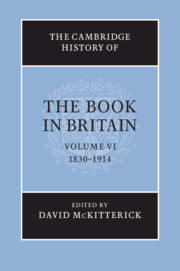Book contents
- Frontmatter
- Introduction
- 1 Changes in the look of the book
- 2 The illustration revolution
- 3 The serial revolution
- 4 Authorship
- 5 Copyright
- 6 Distribution
- 7 Reading
- 8 Mass markets: religion
- 9 Mass markets: education
- 10 Mass markets: children’s books
- 11 Mass markets: literature
- 12 Science, technology and mathematics
- 13 Publishing for leisure
- 14 Publishing for trades and professions
- 15 Organising knowledge in print
- 16 The information revolution
- 17 A place in the world
- 18 Second-hand and old books
- 19 A year of publishing: 1891
- 20 Following up The reading nation
- Bibliography
- Index
- Plate Sections
- References
5 - Copyright
Published online by Cambridge University Press: 28 March 2010
- Frontmatter
- Introduction
- 1 Changes in the look of the book
- 2 The illustration revolution
- 3 The serial revolution
- 4 Authorship
- 5 Copyright
- 6 Distribution
- 7 Reading
- 8 Mass markets: religion
- 9 Mass markets: education
- 10 Mass markets: children’s books
- 11 Mass markets: literature
- 12 Science, technology and mathematics
- 13 Publishing for leisure
- 14 Publishing for trades and professions
- 15 Organising knowledge in print
- 16 The information revolution
- 17 A place in the world
- 18 Second-hand and old books
- 19 A year of publishing: 1891
- 20 Following up The reading nation
- Bibliography
- Index
- Plate Sections
- References
Summary
Domestic copyright - Talfourd’s struggles and the 1842 Copyright Act
British copyright’s major failing during the nineteenth century was the fragmented and complicated state of the law. The Royal Commission of 1878 described it: ‘wholly destitute of any sort of arrangement, incomplete, often obscure, and even when it is intelligible upon long study, it is in many parts so ill-expressed that no one who does not give such study can expect to understand it’. Faced with fresh challenges to the prevailing law, whether domestic or international, legislators scarcely knew where to start. Copyright’s influence was felt in many fields, which made it extremely troublesome politically. Diverse groups considered themselves to have a stake in copyright law, so attempted to defend and advance their interests, sometimes demanding change and sometimes resisting it. Successive governments found it impossible to be proactive in their strategy, and were reduced to tinkering with the most urgent difficulties, or simply stalling. A patchwork of statutes chronicled the activities of trade and other interest groups, and, regrettably, mirrored their lack of coordination. The need for a coherent approach to copyright, preferably embodied in a single act, was clear for much of the century. The problem lay first in conceiving and then in negotiating a practical solution.
This was a time of great change in the book trade. Technological innovations, such as the steam press and stereotyping, drove prices downwards and engendered new sources of competition for the established publishers. Production increased very considerably during the nineteenth century, with some periods showing dramatic rises. In the eighteenth century, when books were a hand-crafted luxury, readers had been concentrated in higher social and income groups. In the early part of the nineteenth century, high-priced books continued to form the greatest percentage share of published titles.
Keywords
- Type
- Chapter
- Information
- The Cambridge History of the Book in Britain , pp. 214 - 237Publisher: Cambridge University PressPrint publication year: 2009
References
- 4
- Cited by

